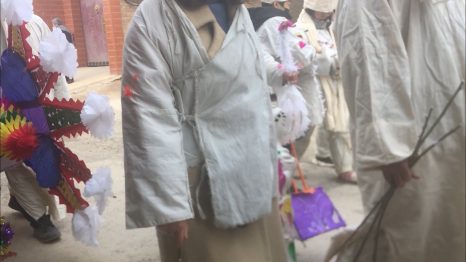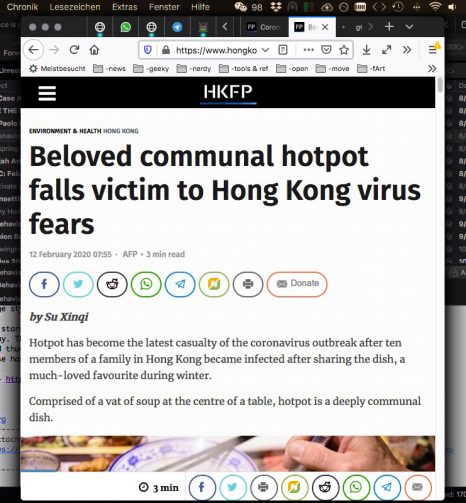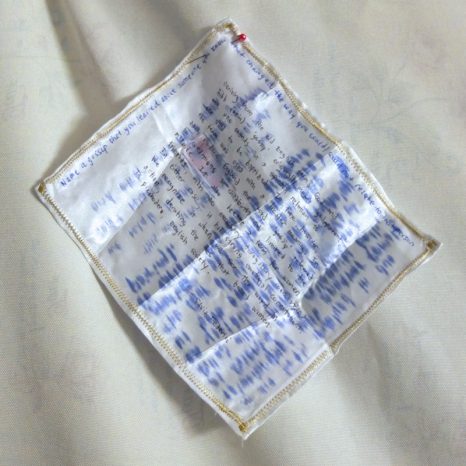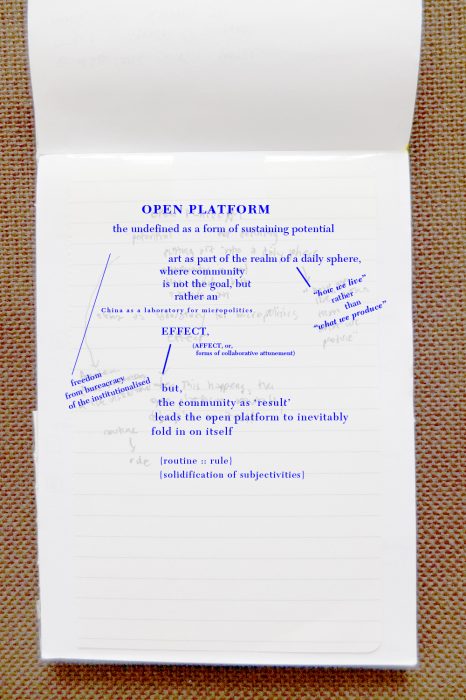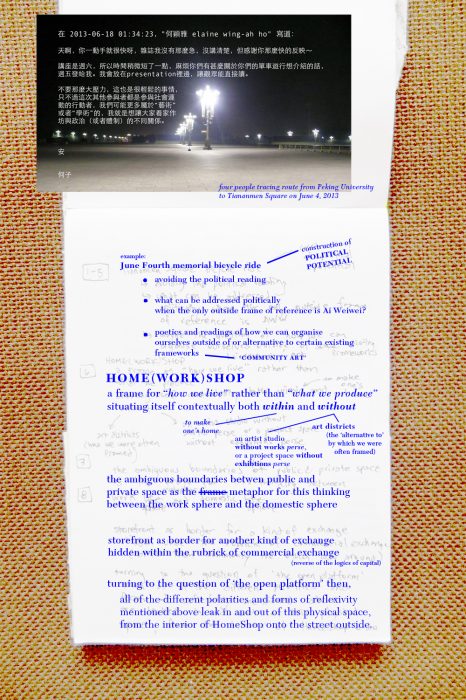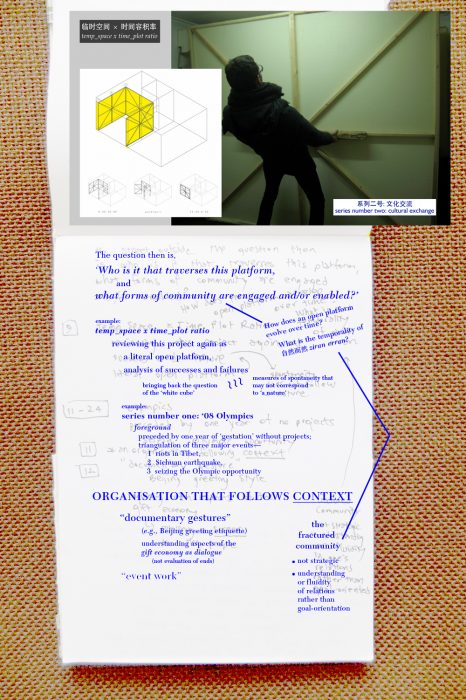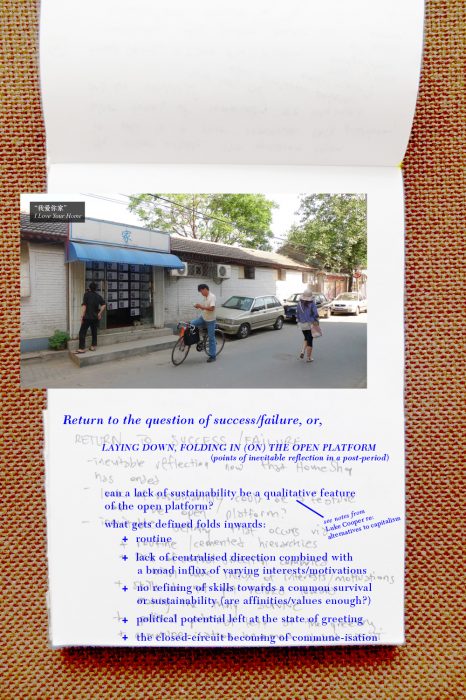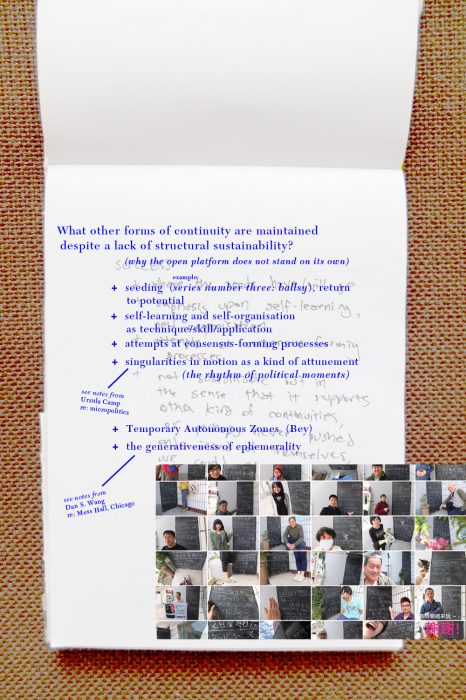Activism is increasingly instrumental, meaning it’s a form of power that is tied to the logic and algorithm of the status quo. This makes activism, even in the search for justice, a creature of the status quo, which renders hope and justice, as ironic as that sounds, a creature of the things we’re trying to leave behind.
— Dr. Bayo Akomolafe on Slowing Down in Urgent Times
it awoke me from sleep, the thought. A correction. something that clarified the feeling of not wanting to forgive, or not being able to. it’s trite, but three had always been my breaking point in this series of incursions, especially in those cases when there has been a latitude of attempted understanding and reasoning in between. the recipient of the gaslight, on the other hand does not calculate. how much is enough? the arbitrariness of numbers is probably less reasonable than the process of enduring or the tenacity of tolerating or the act of forgiving. actually on a certain level, it would be unreasonable——no?——to say to a friendship, to love, that i do not accept this anymore. right? W says there is no reason to 絕交 and we need time to learn and understand one another. of course. but what if i say simply that i am unable to continue like this? i do not like to count, but something keeps ticking. was it that which woke me from sleep?
perhaps it was the sudden clarity of watching an awkward transpiring of a series of very reasonable utterances of ‘not quite loyal’ words. the crispy field recordings of an anthropocene, brown noise wilderness that had kept me unconscious before came back again through the reverse journey from sleep into a dream-like scenario. i am in the post-apocalyptic game which we had romanced together last summer. so i am alone, but reflecting upon relationships that are perhaps no longer possible, and there is something forlorn and undone about this, though that’s what apocalypse is really. it’s drizzling and murky here all the time, here and there, we woke into dream and reality is simply a matter of perspective. it’s exactly that we argued about this, a simple difference of experience about something that happened in the past. you brought it up because you were hurt and disappointed, but what is meant by ‘not quite loyal’ is that hurt is prickly and dishonest if it only cowers behind rage. it’s reasonable, yes, like when i reason with myself that forgiveness is a higher ground. i’ve still never gotten there, still on game one(放下,ä¸æ˜¯æ”¾æ£„,而ä¸æ˜¯å¤±åŽ»ï¼‰, too short of an attention span for mantras.
how does she keep forgiving? it’s a questionably positive character trait these times around, a puzzle to play on both sides, like when S describes M’s bad quality of not being able to see anything negative of anyone else. I thought when she said it, oh, how strange that is! What’s so wrong with roses? But anyway, I am not M nor your ex-girlfriend, not so forgiving and not so resilient, maybe not so tolerant, not so enduring. i don’t want to calculate, but don’t know how to bear the unfair exchange of a wound for a blow, even if understand how I may be implicated in its opening. I am sorry, even, that I said something awkward and ambivalent when we played the game that time, but wasn’t it obvious that we were in the grey and murky chapter where awkward and ambivalent things are uttered? Is being sad and disappointed a violence already inflicted, with reasonably violent returns? That is the ambivalence of saying stupid things that you realise are stupid in the midst of voicing them, but there they are, your mouth is open, stupidity lays before you just as the person in front of you, the one who receives it while listening with an unwittingly ever so slightly peaked (piqued?) eyebrow. The person in front of you doesn’t say anything in this moment, of course——that’s what ambivalence does; it delays time in the staccato of its complexly unfurling hesitations, though the simultaneous folding in and folding over of affect leads to other arhythmic utterances for which connections are astray and hence may also be categorised as stupid. ‘retarded’ is a politically incorrect term these days, but it is exactly about the mismeasure of time rather than being wrong or right per se. Ambivalence is fair. Its slowness is an emphasis upon space rather than its surrounding points and prickles.
justice requires calculation. but i’m no heroine, and it’s always a bit more complicated than that.
Posted by 丫 | reply »without cringing 2022 screenshots of january and june Posted by 丫 | reply »
eliminating poverty
i went to a funeral today in my village with a cousin. she is his relative and died in hunger and coldness and illness two days ago at home. in her early 50s. the widow had spent months on bed alone, and was given a bun twice a day, later once a day, by her brother who is also poor and unable to do more. a few months ago, she almost died in a similar situation, but survived to the surprise of everyone. some villagers said given her situation, death is finally an end of her suffering and perhaps it is better this way. some said she had a soft temper. some said she was lazy and slow. some said she suffered from alzheimer’s along with mental issues.
three years ago, her husband went to a government office in the city with two boxes of apples as gift to apply for state benefits. on his way back home he fell to the ground. he was taken to hospital and doctors said it was hemorrhagic stroke and asked for RMB 5,000 to do the surgery. relatives were called one after another. it was only late at night when one relative finally showed up ready to pay. doctors did a CT scan and found his brain was already flooded with too much blood to do anything. he died.
the couple had been living in an old yard with no walls, full of overgrown weeds, and basically only one room with a bed. they had adopted a daughter from her sister from another village when the girl was around ten. but they were not able to pay her education and living costs and her sister paid. later her sister cannot afford either and the girl dropped out and went to work in the city. they devoted much love to the daughter but she felt ashamed of their poverty and hoped to have nothing to do with them. the daughter went back to her biological family and did not care very much for them. so today is certainly the last time she is in this village. it is also the end of a whole household, a family.
my cousin said the way poverty was “eliminated” here is often by cancelling the recipients’ poverty status in documents, which results in recipients receiving even less benefits. some villagers said in these two years the government offered subsidies for electric heaters so that many households had bought and installed it for just 200 yuan, including this household. previously villagers used coal, which became illegal in recent years for environmental reasons. but many families find the electric bill too expensive and rarely use it in winter, including the two old relatives i visited today who did not even know where is the on/off button.
the funeral was simple, not heavy, and cost only a few thousand yuan. my cousin, along with another relative, left before the procession took the coffin to the field for burial, partly because they were busy and partly because they knew the meal provided at the end of the funeral, which is the local custom, would not be a feast and probably wouldn’t even contain any dish with meat.
— posted with permission from an original text by Pop,
2020年12月17日,早上07:55
“these timesâ€
these times
these special times
these unusual times
these weird times
these difficult times
these uncertain times
these turbulent times
these strange times
these difficult and complex times
these harsh times
these dreary times
these trying times
these crazy times
these troubled times
these pandemic times
these distressing and surreal times
these extraordinary times
these times of crisis
times like these
—an index of “these times†as found in my inbox, spring/summer 2020
Posted by f | more »Textual Notes PWSSSRFS…
(there are reasons to think about my body and hygiene these days)
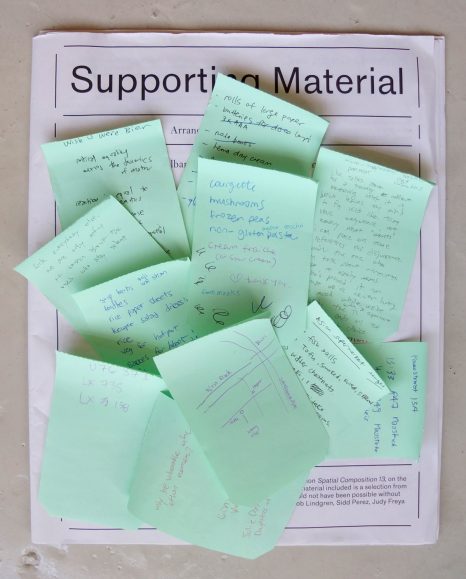
— Notes taken while on residency with Amy Suo WU at Motel Spatie; Arnhem Presikhaaf, 2020 January-February
In the time of that sojourn, a surface wound that stayed the entire time, irritated, flaming and hardened so much that it was narrated from being the oddity of a pimple on my hand to the paranoia of a wart-like abscess. It accompanied me during our conversations like a replacement for the biting of nails which had accompanied me since childhood, the extra psychosomatic conversation with myself to harmonise and discord with any other conversations going on in the room. And we spoke about intersectionality.
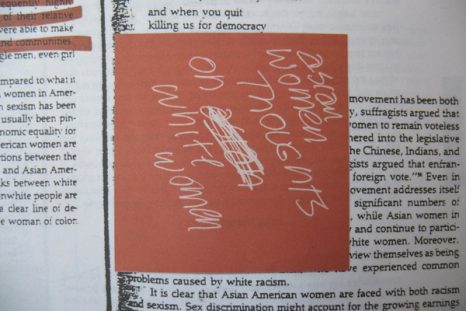
— from “Worlds in Collision: Multicultural Art History (Selection)” by Carlos VILLA, from Supporting Material by Celine CONDORELLI
I picked at it, making it bleed and scab over more than once, wondering if this would be the lifelong marker with which to remember this time. Other people get tattoos for such occasions, but somehow for me bruises, scars and mosquito bites were always enough. Sometimes I liked to think about the tiniest bit of spittle from an insect you never saw being smuggled transnationally, at peak seasons such that your body could carry two nationalities of mosquito saliva at the same time, recognisably different by the radius of red and degree of itch.
It was only a surface. But as my skin-scoring became manic, I remembered one of the first meals we shared together, when we were happy to find a few pairs of disposable chopsticks in the otherwise fork-and-knife-loaded space. A bit too brashly did I rip apart the two sticks and rub their ends together so as to smooth the rough edges in the way that we had learned, and somehow a little bamboo splinter had lodged itself into the meat between the thumb and forefinger of my right hand. This is the pressure point you are supposed to massage in order to release anxieties, and so it was that this residency——initially planned as an artistic labour——unfolded into my body subversively with a small army of histamines hardening a point known as åˆè°· hégÅ, or LI-4. Like a pain to help release pain.
I had been telling everyone that it had been such a difficult year for me, or for most people in my context, rather, but now, when I had limited this sabbatical purposefully to run back into the fire, that heat seemed to flake away into something much more quietly insurrectionary, like the last hibernation before the end of the world. What were we gathering amidst these stories and meetings, me picking self-consciously at a surface wound on the back of my hand and scheming in those vague ways afforded by poetry? Would it be possible to be productive about this care in letting go, somewhere in between concern and a manic extraction of the conversation one has with oneself, parasiting off of the glimmers of knowledge and joy and jealousy of these people around me. So many intensities.
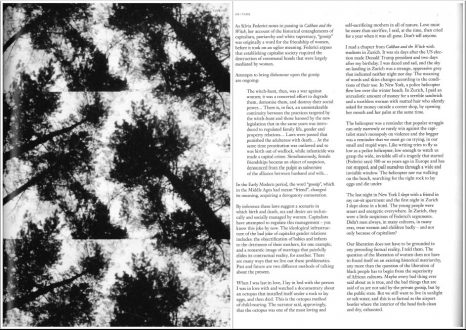
— “Witch-hunt: gossip has always been a secret language of friendship and resistance between women”, Hannah BLACK
In many parts of the world, women have historically been seen as the weaver of memory——those who keep alive the voices of the past and the histories of the communities, who transmit them to the future generations and, in so doing, create a collective identity and profound sense of cohesion. There are also those who hand down acquired knowledges and wisdoms——concerning medical remedies, the problems of the heart, and the understanding of human behaviour, starting with that of men. Labelling all this production of knowledge ‘gossip’ is part of the degradation of women——it is a continuation of the demonologist’s construction of the stereotypical women as prone to malignity, envious of other people’s wealth and power, and ready to lend an ear to the Devil. It is in this way that women have been silenced and to this day excluded from many places where decisions are taken, deprived of the possibility of defining their own experiences, and forced to cope with men’s misogynous or ldealised portraits of them. But we are regaining our knowledge. As a woman recently put it in a meeting on the meaning of witchcraft, the magic is: “We know that we know”.
— Witches, Witching-hunting and Women, Silvia FEDERICI
Among you, it becomes difficult to compare all that has been said to all that has not been said. All of these conversations. And these words are a conversation with those conversations, if not simply out of a question of translation but out of the need to make space for myself in this constellation of you(s) and me(s). To ascertain, like that book I took from your bookshelf: Feelings are Facts. We(s) would need to meditate through hours and hours of these discourses in order to sift though the medley of feelings that make up this moment, and that is a fact, too. Yes, as the witches say, “We know that we know“.
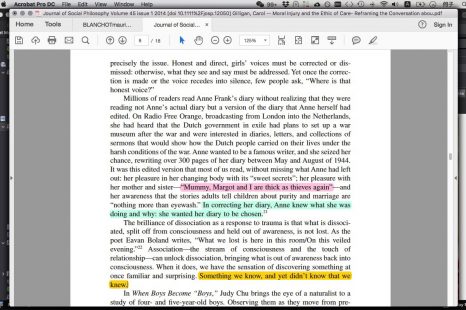
— “Moral Injury and the Ethic of Care: Reframing the Conversation about Differences”, Carol GILLIGAN
And maybe I know too many things. My head is filled with all sorts of banalities like the facial expressions of strangers and the taste of your favourite Grüner Veltliner and the prick of winter mosquitoes. Like the approximate sojourn of a piece of shit that appeared a few days after I arrived. It was the lack of anyone’s care to remove it from the narrow path between our residency room and the project space, making it such that you took the long route around every time, while I forged ahead to play hopscotch. I had the forethought that this dog I never saw had left the natural wastes of its circulating body just like the mosquitoes, and perhaps I should bring other contraband back this time as another memento of my stay. But an uncared-for poop was just a parallel temporary visitor like us to this space motel, and the day before I departed, what were now like hardened coal nubs finally blew away with that strange storm of not very much rain. Perhaps its winds were so great it blew its own rain away, a storm having a frightening conversation with itself. Its utterances came out like screeches and gales that shook the glass of our cove. From inside, we lifted our heads up in awe, and when we went outside we walked at strange angles with our heads down, pretending not to overhear. Buddha was also blown violently away that day, falling off of a neighbour’s balcony and left as an Asian corpse shattered in the white neighbourhood. In the beginning I kept thinking we would have been a strange sight here, our little crew, but actually there was nobody around most of the time, and we were left to play on our own like children at the slumber party. We stole time that way, turning their money and our own productivity into a space for taking care. Even so, I walked on that shit at least once, but you took time, and we cleaned up our tracks together. Self-quarantine, if you want to call it——I gained ten kilogrammes, too——but something else feels lighter because I know we had taken it on together. This takes space and so it was that ‘project ruimte’ was exactly that, not as the space for projects but a project to make space, as a fact of feelings between us——to read together with long pauses in between, to write letters from near and far, and to eat and resist the fallen communality of a shared meal out of one bowl. To be together and trust in someone else’s voice to guide when our eyes are closed.
I don’t know yet how to bring this space into visibility. And maybe it doesn’t have to, except as mischievous glances and giggles between those of us who know, and even if you don’t see us you will feel the smiles in our voices in that space behind your ears and in front of your neck——a tingling somewhere between an itch and a tickle to make chords and discords in you, too. Take care.
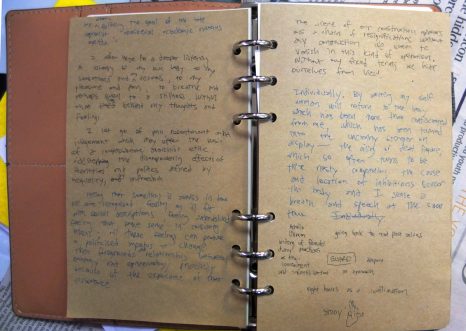
— Altered quotations and notes taken from the afwasdoekje reading group, PWSSSRFS No. 1, 2020 January 25
Posted by 丫 | reply »
KUNCI = keys, soul, rainy season, chicken katsu
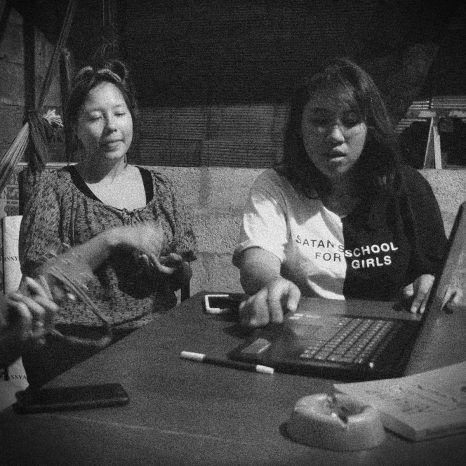
Recorded 15 December 2018 around 8 pm at KUNCI Cultural Studies Center, Yogyakarta, during the rainy season
with sounds from // Monika AJAS, Ying QUE, Alicia KEYS, Meghan TRAINOR featuring John LEGEND, SYAFIUTADINA, 何穎雅 Elaine W. HO
Posted by 丫 | reply »
wedged in something that has to do with the world
Science went away for some time, but left rusty Technic behind. There was a small key with a black plastic coated head. We unlocked her and rode with her rhythms, though something kept nerves piqued at the same time as familiarity made everything gummy inside. The remembering of being here before, when things were more regular, and this was before you knew Science, when things were simply intuitive. But now your muscles were taut and that thing on the back kept falling off and you didn’t know if it was your doing or not or if we would survive until Science came back.
In the end you left before she did, and your tight outer edges and chewy fillings didn’t know what to do with the small key except, on the way out, wedge it quickly between something that has to do with the world or the universe. Technic was left outside to nature.
It should have been one week, but it was months, months, months. Where on the flattened earth does Science go? You worried for a moment until you forgot. And by the time she came back looking for worlds in universes, you couldn’t quite remember the game either, only that you had been looking downwards, so it must have been about waist height. She played several rounds over a few more weeks, and almost even lost it for a second.
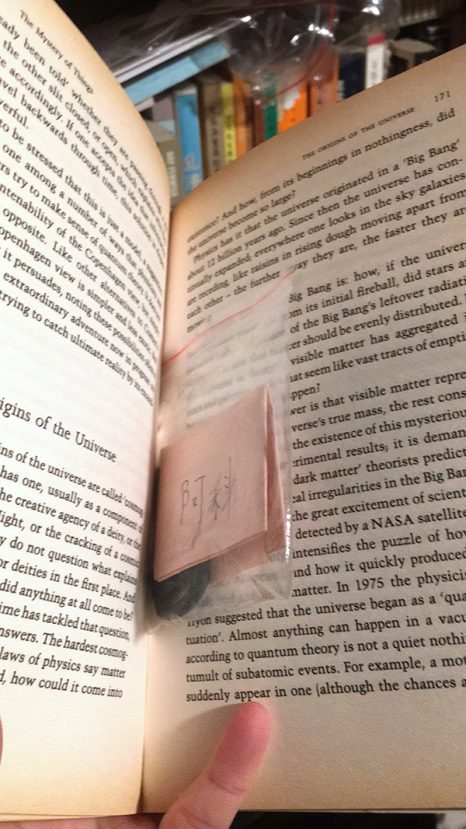
 the best review i’ll ever receive
the best review i’ll ever receive
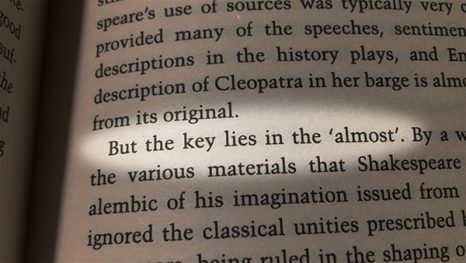 æ”å½± photos // 阿科 a KE
æ”å½± photos // 阿科 a KE
Posted by 丫 | reply »
notes for the academy of failure, 25-27 May 2018 and a slew of logos to support
“Illegibility, then, has been and remains a reliable source for political autonomy.”
- James C. Scott, Seeing Like a State: How Certain Schemes to Improve the Human Condition Have Failed (1999)
it’s an easy preemptive manoeuvre, maybe as a way of saving face, because we have been so institutionalised that consciousness becomes a way of negating the negation. “let me tell you i’m a loser, let me tell you before you find out for yourself, and you can never get me.” what does it mean to precede and gestate one another?
if preceding was a manner of not being defeated by you (insertion of Super Mario anecdote here), gestation was a stalling grammar of potentiality, latent and shadowy, unbecoming. but how do we unbecome one another, with one another?
he says “æ¬ ” appears only when ego exists, but really i didn’t mind feeling indebted to you. the hat was out, and i wanted to ask you a favour because i knew you could ask me any time, even if you didn’t. i wanted you to know that i owe you a lifetime. that was my way of staying connected to you. it was only a pity that after i thanked you for that one, you simply left, without a thought in your mind. i was hurt and angry, i am hurt and angry …because i thought you owed me an apology? fuck!
we’re back to the peculiarities of voice, i guess (play with the pronouns)
“S. loved the paintings, but as she was praising them, she knew they didn’t stand much of a chance in the art world. If R. made the same work but was twenty years younger, had different friends and used different words to describe them, they would be viable.”
- Chris Kraus, Absolute Love (2016)
images above from notes initially taken to prepare for a talk given at the Collaborative Studies Program (CSP), organised by the Asian Culture Research Institute (formerly known as Asian Culture Information Agency in Asian Cultural Complex), Gwangju, South Korea, August 2014. This overloading of prepositions recontextualises a later refabrication of the notes into jpeg images called “(An) Open (and) Failure”, part of Squatting Knowledges: Failure/s in a constellation and as a tribunal, curated by DiscLab Research and Criticism (November 2014 until an unknown date when the site was removed from the world wide web for reasons not known)
ï¼ï¼ï¼
何穎雅 Elaine W. Ho will be an adjunct lecturer at the Academy of Failure: Pedagogies for the Unsuccessful, 25-27 May 2018 in Beijing, PRC.



